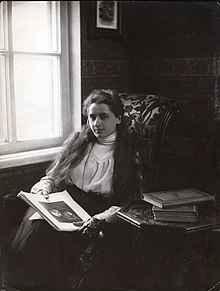Ekaterina Pavlovna Peshkova
Yekaterina Peshkova ( Russian Екатерина Павловна Пешкова * July 14 jul. / 26. July 1876 greg. In Sumy , Russian Empire , now Ukraine ; † 1965 in Moscow ), born Wolschina ( Russian Волжина ) was a Russian human rights activist and the first Mrs. Maxim Gorkis .
Life
Ekaterina Wolschina came from a noble family in Sumy . There are three known variants of her date of birth.
After graduating from high school in Samara in 1895, she worked as a proofreader for the Samar newspaper . There she met the journalist Alexei Peschkow , who wrote under the pseudonym Maxim Gorky . They married in 1896, their son Maxim Peschkow (1897–1934) was born in 1897, and their daughter Katja was born in 1898, who died of meningitis at the age of five . 1902–1903 they lived in Nizhny Novgorod in an apartment that is now the Gorky memorial . In 1903 after the daughter's death they separated.
1907–1914 Jekaterina Peschkowa lived with her son Maxim outside of Russia, mostly in Paris , attended French courses for Russians and social science lectures at the Sorbonne, and worked for the Social Revolutionary Vera Nikolaevna Figner's aid association for forced laborers and exiles . From 1913 to 1914 she worked in the Red Cross 's aid organizations for war victims .
After the outbreak of World War I , Peschkowa returned to Russia from Italy via Constantinople and Odessa . She became a prominent figure in the Social Revolutionary Party , of which she had been a member since 1905, and in 1917 became a member of the Central Committee. After the party collapsed, she made the archive available to the revolutionary Felix Dzerzhinsky .
Peschkowa worked continuously in aid organizations of the Russian Political Red Cross for political prisoners , headed the children's commission of the Society for Aid for War Victims and organized a volunteer group to search for children behind the front line . In 1917 she became head of the new office of the Political Red Cross , which was now called the Moscow Society of the Red Cross to Help Political Prisoners , and later deputy chairwoman of this society, where she worked with the human rights activist Mikhail Lvovich Vinawer (1880-1942). In 1919 she was officially charged with the search and repatriation of the legionnaires of the Polish Piłsudski Army . In 1920 she was also appointed representative of the Polish Red Cross for the repatriation of Polish and Russian prisoners of war to their respective home countries. From 1922 she led the aid organization for political prisoners , which existed until 1937.
After the start of the German-Soviet War , Peschkowa was evacuated to Tashkent in 1941 . In her last years she was a consultant of the archive of the Maxim Gorky - literature -Instituts in Moscow .
Peshkova died in the Kremlin hospital in 1965 and was buried in the cemetery of the Novodevichy Convent .
Peschkowa's sister Alexandra Pavlovna Wolschina had married the Belarusian ethnographer Adam Yegorowitsch Bogdanowitsch (1862-1940). Her son Maxim had died in 1934. Her granddaughter Marfa married the Ukrainian engineer Sergo Berija, son of the secret service chief Lavrenti Beria . Her great-granddaughter Darja was an actress at the Wachtangow Theater and married the local actor Alexander Konstantinowitsch Grawe .
swell
- Honor over duty . Obituary of Izvestia , March 30, 2006
Individual evidence
- ↑ Maya Kofman: Yekaterina Pawlowna Peschkowas Help for Political Prisoners (Russian). VORTZLEN Roots SHORASH Magazine for Jewish Communities , accessed September 3, 2015
- ↑ Yaroslav Leontjew: The human rights activists Novaya Gazeta No. 81, from October 31, 2002 (Russian), accessed on September 3, 2015
Web links
| personal data | |
|---|---|
| SURNAME | Peschkowa, Ekaterina Pavlovna |
| ALTERNATIVE NAMES | Пешко́ва, Екатери́на Па́вловна (Russian); Volschina, Ekaterina Pavlovna |
| BRIEF DESCRIPTION | Russian human rights activist and first wife of Maxim Gorkis |
| DATE OF BIRTH | 1876 |
| PLACE OF BIRTH | Sumy , Russian Empire , today Ukraine |
| DATE OF DEATH | 1965 |
| Place of death | Moscow |

